

Group head of legal and corporate affairs and company secretary | aCommerce Group







Rijuta Misra
Group head of legal and corporate affairs and company secretary | aCommerce Group
Team size: Four
Could you share an example of a time when you came up with an innovation that improved how your legal team works and did not come at a large expense?
Rather than building an innovative solution, our team adapted existing tools within the organisation to enhance efficiency and manage our work better:
DocuSign: We implemented DocuSign for most contracts and paperwork. This helped expedite the approval process and supported our goal of going paperless, benefiting both the organisation and the environment.
Trello and Jira: We use Trello and the Jira ticketing system to assign tasks within the team and maintain clear communication. This provides visibility into who is doing what and the progress being made.
Virtual Data Rooms: For our due diligence process during IPO and fundraising rounds, we adapted Virtual Data Rooms. These not only make it easier to share and navigate files but also utilise AI to streamline the process.
AI Tools: We are cautiously using ChatGPT and similar AI tools for basic tasks, which helps speed up our day-to-day operations.
Microsoft Excel: I encourage my team to learn advanced features in Microsoft Excel to save time and increase efficiency in our work, by attending various training sessions available online and in my organisation.
Which recent political, economic or regulatory changes have impacted your work the most in recent years?
The most significant recent change impacting my work has been the introduction of the PDPA (Personal Data Protection Act) in Thailand, given the nature of the industry I am associated with. Before the PDPA’s launch, we had been trying to stay compliant through GDPR (General Data Protection Regulation) guidelines. However, having specific regulations tailored to the Thai context and local businesses has been beneficial.
One of the major tasks was understanding and ensuring compliance with ROPA (Records of Processing Activities) under the PDPA. We spent a considerable amount of time reading, interpreting, and implementing these regulations, including regular brainstorming sessions and training. Overall, the project has been a valuable learning experience.
Are the effects of AI on the legal world overplayed, or underplayed?
The effects are underplayed, as I believe the future is changing in a way that makes the loss of jobs for many lawyers and paralegals imminent and unavoidable. As I understand it, those who may lose out in this AI era are primarily the ones not paying close attention to using AI technologies to their benefit. By leveraging AI to increase efficiency and stay relevant by expanding their scope of work, legal professionals can better navigate these changes. The most common tools for the legal industry are contract management, contract review and approval processes, due diligence, minute taking, and legal research.
With the introduction of AI to this world, almost a year and a half ago, it is becoming increasingly difficult for law firms to justify their billable hours now as their corporate legal clients understand the work that AI could produce for the firms. On the other hand, we as in-house counsels are also finding it difficult to justify our budgets and time management if we are not working in a smarter manner. Nonetheless, I remain a supporter of the school of thought of staying adoptive and welcoming to change. With technology, our expectations, demands and how we work shall be modified, but we lawyers shall be able to use it to our benefit.